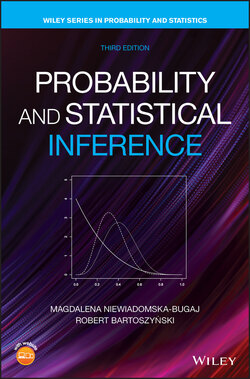Читать книгу Probability and Statistical Inference - Robert Bartoszynski - Страница 34
1.4 Infinite Operations on Events
ОглавлениеAs already mentioned, the operations of union and intersection can be extended to infinitely many events. Let be an infinite sequence of events. Then,
are events “at least one occurs” and “all 's occur,” respectively.
If at least one event occurs, then there is one that occurs first. This remark leads to the following useful decomposition of a union of events into a union of disjoint events:
(1.6)
where is the event “ is the first event in the sequence that occurs.”
For an infinite sequence one can define two events:
(1.7)
and
(1.8)
these being, respectively, the event that “infinitely many 's occur” and the event that “all except finitely many 's occur.” Here the inner union in the event (1.7) is the event “at least one event with will occur”; call this event . The intersection over means that the event occurs for every . No matter how large we take, there will be at least one event with that will occur. But this is possible only if infinitely many s occur.
For the event , the argument is similar. The intersection occurs if all events with occur. The union means that at least one of the events will occur, and that means that all will occur, except possibly finitely many.
If all events (except possibly finitely many) occur, then infinitely many of them must occur, so that . If then (see the definition of equality of events) we say that the sequence converges, and .
The most important class of convergent sequences of events consists of monotone sequences, when (increasing sequence) or when (decreasing sequence). We have the following theorem:
Theorem 1.4.1 If the sequence is increasing, then
and in case of a decreasing sequence, we have
Proof If the sequence is increasing, then the inner union () in remains the same independently of so that . On the other hand, the inner intersection in equals so that , which is the same as , as was to be shown. A similar argument holds for decreasing sequences.
The following two examples illustrate the concept of convergence of events.
